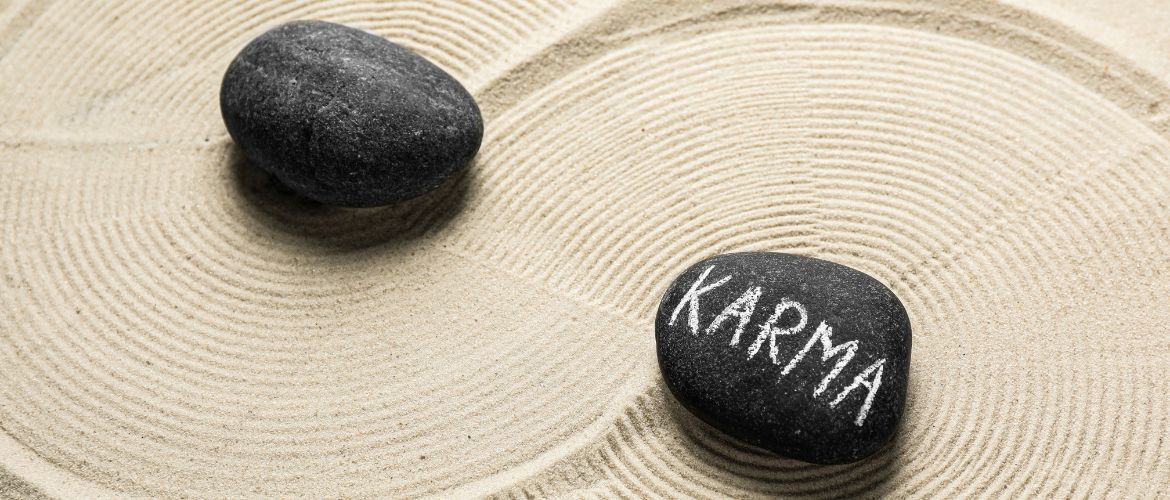Karma and Clairvoyance
“To everything, turn, turn, turn
There is a season turn, turn, turn
And a time to every purpose under Heaven” –The Byrds
Karma is a term used in Indian religious traditions and new-age circles to describe how every thought, word, act, or deed has a consequence. It may also be viewed as a principle of cause and effect, that for every action, there is an equal and opposite reaction that counterbalances. It could even be related to the ‘golden rule’ of do unto others as you would have them do unto you.’
Karma can be confused with the notion of fate and destiny. Linked to this concept of Karma is reincarnation. According to karmic beliefs, good deeds create a favorable rebirth, while evil deeds lead to unfavorable rebirths. However, some traditions do not speak of Karma and reincarnation.
Karma has three main themes, with a few variances according to certain religious and spiritual traditions.
Cause and Effect
The first theme of Karma is cause and effect, meaning that every action has an equal and opposite reaction. According to this, what we do has a reciprocal effect. One variance is that deeds create desired results, so if you want to live a happy and prosperous life, you spread this through your acts.
Past Lives
The second theme of Karma is that a person’s deeds will positively affect the next lifetime. If someone has a harsh or challenging life, it may indicate that they were not respectful or virtuous in their previous lifetimes. In other words, Karma is also ethical; how you act in one lifetime has a ripple effect on your next lifetime.
Rebirth
The third theme of Karma is that you reincarnate according to your Karma from previous lifetimes. This theme is present in many Eastern traditions and is often used to justify socio-economic placement. Rebirth is the idea that we reincarnate into new bodies across lifetimes. The essence of our spirit remains the same, and we carry the knowledge and information gained with us from one lifetime to another. Whether we remember experiences and use them to inform a current incarnation is personal to each individual.
Modern Spirituality
Karma is often used as a word to describe that someone is going to ‘get their karma,’ ‘had it coming to them,’ or ‘doesn’t want to have any karma’ or to explain how a person may be struggling in this life as a result of actions in a previous lifetime. It is a shorthand to describe birth, death, and rebirth cycles and how a soul reincarnates from lifetime to lifetime. Discussions around Karma are present in many new age and spiritual circles.
Criticisms of Karma
Some criticisms of the notion of Karma include disempowering the individual to make choices in their life, seen as a way to “blame the victim” for unfortunate events. Many also believe that this is a distorted view of reality that may disconnect a person from the reality of their present time circumstances. Karma can be viewed as a reason not to take action or to excuse certain relationship behaviors. Karma is neither good nor bad; the individual’s attributes matter. Karma is not something to escape or release; it is the essence of life, learning through the contrasts, the ebb, and flow of experiences. Ultimately we are each responsible for our thoughts and activities, and moments where we are less than ideal in our behaviors do not necessarily directly correlate to what we have in store.
Karmic Patterning and Relationships
Karma lives with us and is part of our lives from the very moment of our birth to the moment of our death. Every time that we do something and every time that we stop doing something, that generates Karma, and you cannot avoid it in any way.
Of course, not all the Karma we generate is the same; there is a kind of Karma that ties us or chains us to this life and another type that liberates us of the reincarnation cycle. The Karma that chains us has misery and lack of interior peace as fruits. At the same time, the Karma generated by good or disinterested actions allows us to reach prosperity and happiness of the soul, which is much more than achieving simple external satisfaction.
Every time we face an activity with the desire to obtain a particular result, this throws us into the arms of lust, greed, and ego. In comparison, only the pure actions that we do for love without considering their possible consequences are the actions that drive us, little by little, toward illumination and liberation. Those whose nature allows them to carry out these charitable activities, little by little, realize that Spirit provides them with all they need and inner peace.
A Karmic relationship is on the spectrum of spiritual relationships where individuals encounter each other through lifetimes to learn some more significant spiritual lesson. These relationships may include friendships, family, and romantic relationships. Relationships come with pain and pleasure, and you may feel that you have lived with the other before in some way.
A Psychic Perspective
Karma is a concept explored during a clairvoyant reading. A reader can communicate about past lives and find threads that may bring meaning to the reader. Karma is not a fixed point that never changes. It is dynamic and is part of the human experience, and is a great teacher in the game of life.
Various practices are helpful to shift perspective away from a karmic view of the world where everything is determined and that you may not make changes and expand your awareness. Karma is part of the human experience, and unless you are living on a mountain meditating in a cave, separated from others and reality, there is no way to escape it, nor should we. Receiving communication on karma during a psychic reading is helpful to see patterns in how we approach life and learn and make changes from these points of awareness.
If you want to explore psychic tools, meditation, and psychic development, sign up for our Clairvoyant Meditation Free Open House to learn about course offerings or book a psychic reading or spiritual healing through The Psychic School.



